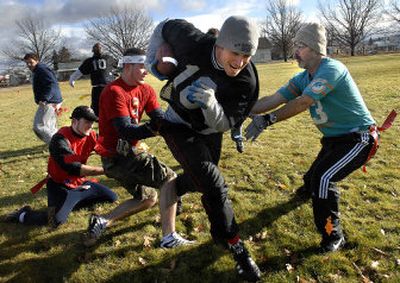Neighborly competition

Out on the wind-swept fields of Chief Garry Park, a motley neighborhood squad sketched out a rather convoluted and perhaps unnecessarily complicated play on the palms of their quickly numbing hands.
Across the line, the opposing team – dressed in black jerseys and festooned with yellow plastic flags – grew restless and boisterous as the huddle dragged on and the scripted play underwent several revisions.
“Adam, when I say ready, you go behind me and I’m going to throw it to Keyatti, and then he’s going to pitch it to you,” Chris Zilar, a 44-year-old county HIV prevention specialist and de facto team captain, finally decided.
Alas, Keyatti Sayers slipped on a pile of wet leaves, a stiff breeze wobbled the pass, and the football skittered harmlessly across the wet grass.
Now in its 19th year, the Chief Garry Turkey Bowl, a very loosely organized battle for neighborhood bragging rights, pleased both the winners and the losers – in large part because of the dearth of injuries.
Organized by Zilar and his three sons, the annual Thanksgiving flag football game has become a classic, a local game that harkens to the famous Kennedy family touch football games organized along the Nantucket Sound in the 1960s. Or something like that.
The rules are simple though occasionally up for spirited debate: Anyone who wants to play quarterback gets a shot. One running play per possession. One blitz for the defense per possession. No tackling.
The beauty of the teams, alternately outfitted in sweats, camouflage shorts and Wrangler jeans, lies in their free-wheeling approach.
“They’re the Dolphins and we’re, well, you can just call us the Savages,” said Jake Miller, 21.
Fair enough.
The Savages jumped out to an early lead – the precise score seemed a matter of opinion – aided by the Dolphins’ unsteady passing game and questionable focus.
“Wait, we’ve got the ball?” asked Ben Strength, a 21-year-old journalism student at the University of Oregon who drove home the previous night from Eugene.
Despite the oath of good sportsmanship, the teams weren’t averse to a little trash-talking.
“You look so pretty when the light hits your face,” Nehemiah Zilar, 19, taunted a friend who lined up opposite him at wide receiver.
On the sidelines, where players had carefully scattered dog feces that had been removed from the playing surface, Chris Zilar held an ad hoc press conference.
“We’ve played in 40-mile-per-hour winds, knee-deep snow, in the rain,” Zilar said. “One year, we played on ice. Actually that wasn’t so good.”
Once, a player required stitches, and another left his functional anterior cruciate ligament on the field. But remarkably few other injuries have been sustained – a fact Zilar attributed to the players’ good nature.
“Most of us have never played organized football,” said Zilar, attired in a Miami Dolphins jersey, black nylon windpants and prescription eye goggles. “I’ve always loved the game, but I didn’t hit my growth spurt until after high school.”
On the field, the Savages’ quarterback lofted a pass to an open receiver, who raced towards the orange pylons.
“Oh dear, oh dear, that’s the first score,” Zilar said.
When pressed for “secret weapon,” Zilar unveiled a classic misdirection play: “All of the players go line up on one side, except for one guy, who stands there like he’s picking his nose, so the defense thinks the play’s going where all the guys are, and the other guy runs out and all the sudden you’ve got a guy standing all by himself.”
After the game, the teams planned to convene at Zilar’s home, where his wife, LeAnne, led a Thanksgiving food team prepared to feed 30 people.
“I always say, ‘You’re invited to come play,’ ” Zilar said. “She says, ‘And you’re invited to stay and cook.’ “
But before the turkey and the tryptophan-induced naps, Chris Zilar had a team to lead.
“Hey, Papa, get back in here,” his son, Jed, 18, yelled.
Zilar politely canceled the interview, readjusted his goggles and jogged back onto the field.
In the heat of competition, it almost seemed an afterthought that two of Zilar’s sons had decided to join the military and, in all likelihood, would be unable to attend next year’s game.